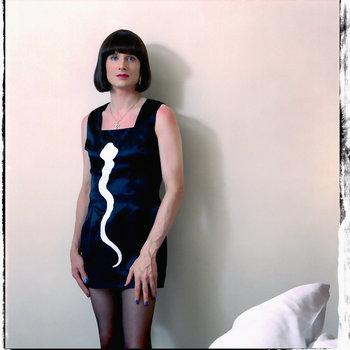
Chris Korda occupies a singular space in the world of contemporary dance music. Who else has made an appearance on The Jerry Springer Show, kick-started electroclash, released contemporary classical records, and played live at some of the most well-regarded dance music festivals in the world? These are just a few of the accolades that dot the CV of one of clubland’s most mythical figures.
Korda has been one of dance music’s chief provocateurs for the last 30 years. Her first record, 1993’s Save the Planet Kill Yourself, was released, in part, to fund her project Church of Euthanasia. The Church, run by Korda and Robert Kimberk, was, as Korda explains, “a theatrical company at [the] height of the street actions period” in the mid-‘90s that eventually landed her appearance on the aforementioned episode of Jerry. But as much attention as the Church garnered for its outlandish proposals (the episode was called “I Want to Join a Suicide Cult”), what is impossible to deny is how killer a club tune the record is. The rhythms are complex and off-kilter, while the melodies have the grating intensity of UK hardcore mixed with a disco swing. It’s this sort of fluidity between the funky and the political that gives Korda her magnetism, the cornerstone of both her long-ranging career in music and politics. As she makes clear, it’s impossible to think of these two ideas as inseparable. Music has always been Korda’s political medium—a way for her to fight back against contemporary culture’s “escape into solipsism,” as she puts it.


Korda got her start in music early. Born in New York City to a family that prioritized cultural immersion, some of her earliest memories are of seeing Led Zeppelin and the Jackson 5 at Radio City Music Hall (she remembers, she and her mom were “the only white people in Radio City Music Hall for The Jackson 5 in 1975”). This period in the late ‘70s, when rock, funk, disco, and soul were all blending into one another, remains a touchstone for Korda’s work; it’s what she describes as “the peak of ‘odd time’ in Western music” where musicians were experimenting with rhythms outside of traditional meters.
These early forays into the world of polymeter fomented both a rhythmic sensibility and something more critical about culture at large. “I’ve lived through the collapse of everything,” she says in no uncertain terms, describing the end of Great Society legislation and the ascendancy of Reaganomics and neoliberalism in the ‘80s. “[We’re] back to where we were before the French Revolution. There has been a parallel collapse in culture: people are getting dumber, the patterns are getting simpler, and people want to be anesthetized all day. I’ve tried to change it by bringing more patterns into electronic music.”
Korda doesn’t use a standard 4/4 template; instead, she uses complex polymeter to achieve sprawling, fluid ends, a vast rhythmic constellation that’s always in flux. “Dance music is extremely conformist and tied to neoliberal capitalism,” she says. “The most efficient and rapid way to achieve profit is to standardize consumption. If everyone wants the same thing, it’s much easier to manufacture what that thing is; if everyone really listens to the same music and takes the same drugs—I associate the modern form of electronic music with the standardization and homogenization of culture.”
Her songs will often shift rhythmic parameters throughout a single track’s runtime. This means her records are often frustrating for DJs to play, but that’s what she’s aiming for: “[People] complain that my records are hard to mix, and I take it as a compliment. That’s good news—I made something that was different and challenging: it’s a good sign,” she says.
When she first became immersed in electronic music in the ‘90s, it was the underground ethos, the music’s roots in Black and queer communities, that attracted her in the first place. Korda’s exposure to dance music culture coincided with her exploration of her gender. “In October 1991, we had a Halloween party and I got the idea to dress as a woman—it was in the air a bit in 1991, ‘I’m going to be a woman’,” she recollects. “It took on a life of its own and […] everyone that saw me [knew] it was more than a costume and encouraged me to go to groups and find more people that were involved.” It was through this experimentation that she discovered Boston and New York’s world of nightclubs and experimental music more generally.
After first getting her feet wet on the dance floor, it was only a matter of time before she started making tracks herself. Even though she achieved a semi-pro level of success as a jazz guitarist in her 20s, it was rhythm, rather than melody, that excited Korda the most. “I would attract the amazement and wonder of my classmates by beatboxing before beatboxing was even a word, but I instinctively figured it out,” she says. Shortly after going clubbing for the first time, she bought a Roland TR-606 in a thrift store and started experimenting with production.
She quickly found herself at the heart of her local Boston club scene, but also started gaining attention more widely. Towards the end of the ‘90s, she picked up an unlikely advocate, DJ Hell, the founder of International Deejay Gigolo Records and the force behind the early ‘00s electroclash movement. The sort of European decadence and hedonism synonymous with electroclash might seem a world away from Korda’s ecological activism (something she is equally surprised about), but it’s also easy to see what attracted Hell to her work: “I was a founder of electroclash,” she says. “One of the key things that Hell saw was that people were getting tired of [white labels]. What was missing was the element of glam and celebrity, and there being something to see and entertain. His idea was to bring personality back into electronic music.”
Korda’s 2003 record for International Gigolo, Man of the Future, oozes personality. The record isn’t the sort of party palliative that many of her peers were releasing at the time. Instead, it’s a blistering critique of a world on the precipice of a meltdown. (One song compares masturbating to watching planetary collapse and 9/11 at the same time.) What emerges is dance music as a vessel for something much larger than clubbing. As Korda reflected on this time in her life, she remembers, “It dawned on me that humanity was overrunning planet Earth like the inmates taking over the asylum.” It was a case of “individualism gone wrong,” she says—the harbinger of a precarious future.
Just as quickly as Korda found herself playing for larger and larger crowds, she turned her back on nightlife. For fifteen years, Korda didn’t release a single record. Part of this was circumstantial (this was around the same time that the vinyl market collapsed; International Gigolo went bankrupt in the mid-’00s), but part of it was also political—Korda was acutely aware of how she had been playing into the commercialization of underground culture that she so vehemently stood against.
During that time, she worked as a software developer, but never fully left music, still tinkering with her machines. After the passing of her mother in 2016, though, she had a revelation. “You think I’m next; it’s time for me to make a stand and devote the rest of my life to art; I had a shot at making this work.” She moved to Berlin and re-immersed herself in club culture, culminating with the release of 2019’s Akoko Ajeji for the famous purveyors of minimal and microhouse, Perlon Records.
It’s a strange and squiggly club record. Some of the tracks feel like conventional dance music (“Ala Aye” is about as good a piano house track as you’ll hear anywhere), but it’s also much weirder and more complex. Melodies and rhythms change with the frequency of a toddler impatiently turning a kaleidoscope. There is a jazz lover’s nimbleness to the drum programming, but also synth lines that work best at an after-party. Put on “Ra Mi” when the sun is coming through the shutters, for example, and wait for the tear ducts to fill.
Returning to clubland after so much time away, Korda is cautious about how the landscape has changed. Gone is the punk ethos that brought her in, as DJs have become the homogenized background noise for people partying. This culminated with a scathing essay she penned for The Ransom Note, critiquing what she decried as the “DJ Pyramid,” where a “monotonous beat” has helped enshrine “a global economic and social order.”
She pulls no punches, going so far as to take on dance music’s sacred Berlin bastion, Berghain. “EDM is increasingly associated with hedonism,” she says. “People feel completely empowered and ignore the music and party and talk. If I spend a weekend at Berghain […] I feel like I spent a whole evening watching people drink and do drugs. It gives people a safe space where they can be themselves, but I don’t consider this as a substitute for a vibrant political musical culture.”
Korda, though, isn’t one just to critique for critique’s sake. She’s also looking for alternative ways to make dance music her own. Her output since Akoko Ajeji has been prolific. She’s released five full-length records that run the gamut from groovy microhouse to one of her most poignant releases to date, Passion for Numbers. The latter is a piano record that she wrote without a piano, making, as she described it, “kinetic sculptures” that build from her algorithmic approach to time and sequence. It’s striking for its unadorned beauty.
All of this has led up to her most recent releases, two mirrored records that feel like the distillation of everything she’s been working towards for 30 years. 2020’s Apologize to the Future is an album-length screed written, as Korda puts it, from the perspective of the Greta Thunbergs of the world—those deeply concerned with climate change. Composed of nursery-rhyme-like couplets, Korda takes aims at everything from noise-canceling headphones to “a sperm and egg lottery won by a fuck.” Setting this to some of her funkiest loops makes the tracks all the more effective; Korda is willing listeners to get lulled into a sense of dancefloor complacency before she jerks them back into reality, either with a jarring lyric or a change in the track’s meter.
2023’s Not My Problem, I’ll Be Dead reverses the perspective, imagining climate change from the perspective of the 1%. Touching on synth-pop and French filter house, drawing lyrical inspiration from the unlikely pairing of Donald Trump and Emily Dickinson, the record is the embodiment of the hedonistic solipsism that Korda has been critiquing for so long.
Korda isn’t under any illusions that her music is going to single-handedly reverse climate change. What she does want to do is force people to ask questions. “How do we change the culture this big and this fundamental? How do we make culture less superficial?”
For her, one way to start answering these questions is to make music itself more challenging and, in the process, instill a sense of social cohesion back into the underground. “In order to solve climate change, we will need solidarity; we need the one thing that we can’t seem to do, which is agree, and the goal needs to be humanity becoming a long-living species. We are having a reality moment,” she explains. “We can’t be special snowflakes. People are retreating from reality—I understand why people want to escape from reality, but it’s not constructive.” And, hopefully, hearing a Korda track in the club is the necessary shock to the system that might make you just that little bit more conscious.







